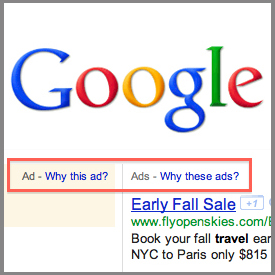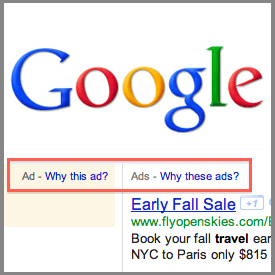Have you ever wondered why particular ads show up when performing a Google search? Do they seem on-target? Way off base? Perhaps a tad creepy? Google’s latest feature, Why These Ads? aims to answer these questions and increase ad transparency.
With Why These Ads? you can learn why a particular advertisement is being shown to you. Google’s official blog gives the following examples of why a particular advertisement might be displayed:
If you’re searching for a local restaurant while you’re on vacation in Hawaii, you would see ads for restaurants that are nearby, rather than restaurants in your hometown. Or if you’re researching flat-panel televisions, and performing a series of similar searches in quick succession, you could see ads based on the query that you just entered, or based on a few recent and related queries within a single browser session. By considering the language you’re using, your geographic location and various other indications, we’re able to show you the best ads possible. We’ve been showing ads in this way for years as a way to help you quickly find what you’re looking for.
In short, Google uses key words, geographic location and past searches to help promote the most pertinent advertisements.
Along with Why These Ads? users have the option to opt-out of personalized advertisements all together with the Ads Preferences Manager. Not only will this system allow you to forgo personalized ads completely, you can also choose to block (or unblock) individual advertisers which you find bothersome. (Note: Google claims that those who opt-out of personalized ads actually see a larger number of ads overall than those who opt-in.)
While Google and other websites have been using these methods to tailor ads to searches for some time, their recent efforts at transparency speak to the larger concern of online consumer privacy rights. By knowing why an ad was chosen for them, users are far more likely to trust the ad (and possibly visit the advertised site) and Google in general. As a web user who is consistently disturbed by the sometimes eerily accurate (and sometimes curiously off base) advertisements on Facebook, I welcome Google’s efforts.




